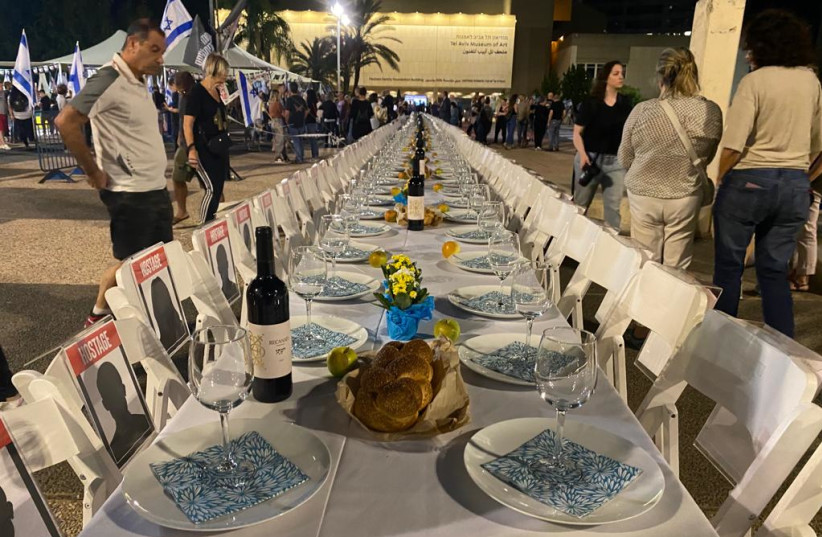As Israel prepares to invade the Gaza Strip, many families of hostages seized by Hamas are pleading with the government to rein in the war effort and instead negotiate the release of their loved ones.
Highlighting the appalling dilemma facing the whole country, other relatives warn mediation could take years and say their best hope lies with the military, hoping ground forces could find the missing men, women and children before it is too late.
Hamas fighters kidnapped an estimated 222 people aged from 9 months to 85 years during their Oct. 7 rampage, during which they also killed 1,400 people. Many of those taken hold dual nationality, including many with US and European passports.
The hostages are believed to be hidden in the Gaza Strip, possibly in a warren of tunnels Hamas has built beneath the enclave, even as Israeli warplanes pound the territory ahead of a threatened invasion, killing more than 5,000 Palestinians.

Prime Minister Benjamin Netanyahu has vowed to eliminate Hamas and Israeli troops could enter Gaza at any moment, but many families are urging him to focus solely on the hostages.
"This should be the top priority, not to destroy Hamas, not to control Gaza and not anything else," said Noam Alon, the boyfriend of Inbar Haiman, a 27-year-old artist who was one of dozens abducted from a music festival.
Family support groups are holding daily protests outside Netanyahu's office in Tel Aviv to keep the fate of the captives in the spotlight, and have set up a table with a place setting for each missing person in a city center square as a symbol of the plight of those abducted.
On Sunday, President Isaac Herzog met scores of affected relatives at his Jerusalem residence, while outside, hundreds demonstrated calling for more to be done for the hostages.
"Revenge is not a plan," read one banner held up by Carmel Gorni, a political activist whose cousin, Yiftah Gorni, was killed during the Hamas assault.
"We need to talk to Hamas. We can't always resort to war. We have so many Palestinian prisoners we can swap for our people," Gorni said. "If our soldiers go in, many people will die, including the hostages."
Prisoner swap dilemma
Not all the families agree.
Ilan and Sandy Feldman were among those who met Herzog on Sunday to talk about Sandy's sister and brother-in-law, Aviva and Keith Siegel, who were kidnapped on Oct. 7 and last seen in a video being driven into Gaza by Palestinian terrorists.
They expressed doubts over whether the Siegels would survive prolonged captivity and thought an invasion was inevitable.
"There is a sense that they won't come out alive. But I think this is bigger than me or us. This is a fight against right and wrong. It is that simple," said Ilan. "There cannot be a place where Hamas lays down roots."
Jonathan Dekel-Chen, whose 35-year-old son Sagui was believed to have been kidnapped from a kibbutz, said Hamas had to be dealt with "now," but thought the army had to make rescuing the hostages the priority of any military campaign.
"It is possible to do two things at once, even for this Israeli government, to do everything in its power to protect the lives and well-being of our loved ones while doing what it has to do to Hamas," he told Reuters.
Israel has a long experience of dealing with hostage crises, but has previously shied away from attempting rescue operations in the densely populated Gaza Strip.
In 2011, Netanyahu released 1,027 Palestinian prisoners to secure the release of army Sergeant Gilad Shalit, who was held in Gaza for more than five years.
Some of the freed Palestinians returned to the ranks of Hamas, including its current leader in Gaza, Yahya Al-Sinwar.
"Should we negotiate with them again? Look at all the people who we released for Shalit and are now the ones who went on and murdered. Was it worth it? I don't know," said Sandy Feldman.
Uncompromising parties at war
Hamas unilaterally released two women with dual Israeli-US nationality last Friday "for humanitarian reasons" in a deal brokered by Qatar, a long-term backer of Hamas.
Mediation efforts are continuing, a Qatari foreign ministry spokesperson has said. However, there is no indication that Israel is in the mood for prisoner swaps.
Netanyahu has appointed a retired general, Gal Hirsch, as Israel's coordinator on the hostages and missing persons. His public comments so far have been uncompromising.
"Our war machine is moving. Do not ask us to stop," he told a gathering of European ambassadors last week in an angry address where accused Western governments of holding Israel back in past confrontations with Hamas.
"This is a wake up call for you. We woke up completely thank God. There will be an unimaginable response. Believe me. We have only (just) started the war," he said.
Hamas has suggested its hostages could be swapped for some 6,000 Palestinian terrorists held in Israeli prisons, but Israeli security experts have questioned whether such a deal could ever happen, even if the government were willing to consider it.
"Hamas isn't stupid. They won't release the hostages all at once. They'll stretch this out over five years," Giora Eiland, a former head of the national security council, told 103FM radio.
Many of the captives have medical conditions that need care or are elderly, meaning time is of the essence.
"Those people don't have much time. We have to help these hostages very fast," said Daniel Lifshitz, whose grandparents, aged 83 and 85, were abducted and have vanished into Gaza.
